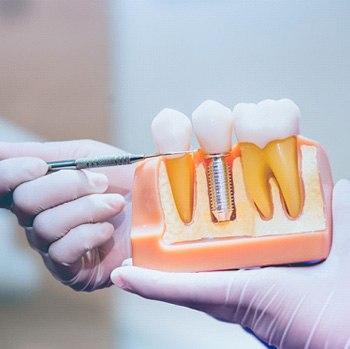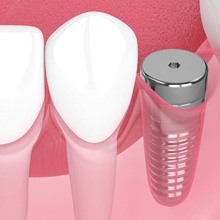
Dental Implants – Hampton, NH
Replacing Teeth from the Root Through the Crown
Many people do not realize how much of a difference it makes when you replace the root and crown of a tooth versus just the crown. This is how dental implants in Hampton work, and it ensures longevity and creates the most lifelike tooth replacement available today. At Oceanside Family Dental, Dr. Neelima Ravi, DMD, FAGD will discuss your concerns in great detail, then create a dental implant treatment plan that will reverse your tooth loss for a lifetime to come. Just call our office today to get started!
Why Choose Oceanside Family Dental for Dental Implants?
- Experienced In-House Periodontist Surgically Places Implants
- Digital Impression Scanner Technology for Precise Implant Placement
- Fair Pricing with No Surprises
What Are Dental Implants?

Traditional tooth replacements, like dentures and bridges, only rebuild the visible crown sections of the teeth. Dental implants go one step further by also recreating the root structure of lost teeth. A dental implant consists of three parts:
- A titanium post that is surgically inserted into the jawbone
- A metal abutment that secures your replacement tooth
- A custom-made restoration (crown, bridge, or denture) that goes on top of the abutment
Because they reconstruct your missing teeth from the roots up, dental implants are widely considered the most comprehensive and beneficial solution to tooth loss. They are able to look, feel, and function almost exactly like the teeth Mother Nature gave you. Plus, they can last for several decades to come!
The 4-Step Dental Implant Process

Getting dental implants requires a unique, multi-step process that can span several months. This might seem like a long time, but the benefits you will experience are well worth the wait! At Oceanside Family Dental, we are proud to complete the entire dental implant process at our practice, so you don’t need to worry about working with an outside specialist in a separate location. Everyone’s treatment looks a little bit different, but here are the four main steps that you can expect.
Initial Dental Implant Consultation

During your consultation, we will go over your oral health and medical history to see if you make a good candidate. If necessary, we can work with you to complete preliminary procedures, like gum disease therapy, tooth extractions, and bone grafting. Then we can move on to planning the rest of your treatment. At this time, we will go over the step-by-step process in detail and discuss the financial aspects of your treatment. No one wants to run into surprises.
Dental Implant Surgery

We complete the entire dental implant process at our practice! First, the area will be numbed with a local anesthetic. Sedation options are also available to make the procedure even more comfortable. Then, an incision is made into the gum tissue so the implants can carefully be placed into the jawbone. The gum tissue is closed, and healing caps are placed over the implants to ensure a proper recovery.
Dental Implant Osseointegration & Abutment

After your procedure, you will go home to rest. Osseointegration needs to take place over the next few months. This is the process in which the implants fuse to the jawbone, allowing for additional stability and success. Your final restoration will then be crafted from the impressions taken of your mouth.
Delivery of Dental Implant Restoration(s)

Lastly, you will return to the dental practice to have your restoration placed. This will be a dental crown, bridge, or denture depending on how many teeth you are replacing. We will check to ensure that your bite is comfortable, and you will be sent on your way to enjoy all of the benefits of your complete smile!
Benefits of Dental Implants

Since dental implants replace the entire tooth, you can expect a long-lasting restoration that you can always rely on. In fact, most dental implants last a minimum of 25 years, but it’s not uncommon for them to last a lifetime. When placed by a professional, they have an average success rate of about 95%.
Furthermore, because they are anchored within the jawbone, dental implants make chewing your favorite foods feel natural regardless of the type of food. Steaks, apples, nuts, corn on the cob, you name it – you’ll be able to enjoy it because your biting force will be restored to the fullest. And, unlike dental bridges, we don’t have to modify existing tooth structure to support an implant because the titanium post is strong enough to hold any type of restoration.
Who Dental Implants Can Help

Dental implants aren’t exclusively for those missing single teeth. Thanks to their versatility, you can replace multiple consecutive teeth and even all the teeth in your arch using dental implants. Here’s how we get it done:
Missing One Tooth
Replacing a single tooth requires one titanium implant placed inside of the jawbone, which is given a few months to heal. Once the mouth is ready, we place an abutment (connector) on top of the implant, so the restoration has a stable foundation. Finally, the porcelain crown is attached, and your smile is fully restored.
Missing Multiple Teeth
A pair of dental implants can hold an implant-retained bridge, which can consist of as many as three replacement teeth. Since the implants have the strength to support the bridge on their own, no modification of existing tooth enamel is required. This is ideal if you already suffer from extensive erosion or tooth sensitivity.
Missing All Teeth
Even those who are missing all the teeth in their mouths can rebuild their smiles with dental implants. By placing a series of implants (typically four to six) throughout the jawbone in the most strategic way possible, we can create a stable foundation for a full or partial denture to snap onto. This means no adhesive is needed to keep your denture in place.
Understanding the Cost of Dental Implants

There are many different types of dental implant treatment, and they each have their own unique price. For example, those who need multiple implants to restore numerous teeth will pay more than a patient pursuing a single implant. Furthermore, preparatory treatments like gum grafts may be necessary as well to ensure a patient can safely receive dental implants, which will influence the overall cost. If dental implants seem expensive, it’s because they are designed to be a long-term investment that lasts for decades. This can rarely be said for either dentures or dental bridges.
Types of Dental Implants

There is not a pre-determined fee for dental implants because their cost is based on your specific treatment plan, like the number of teeth you’re treating. On average, you can expect to pay more if you need to treat several teeth because you’ll need more posts, abutments, and restorations. We’ll provide you with a custom estimate during your initial consultation.
Stages of Dental Implant Treatment

A dental implant recreates your tooth from the root up. This requires a multi-step treatment process that can take several months to complete, but it’s time well-spent because your new smile can last for decades. This also gives you more time to pay for your treatment because you won’t need to cover the entire balance upfront, making it easier to afford your procedure. Although every plan differs, you can expect to pay for:
- Initial Consultation: Besides a visual examination, you’ll also need digital images and a CT scan.
- Additional Procedures: Many patients need additional treatments, like periodontal therapy, bone grafting, or tooth extractions.
- Placement Surgery: Sedation or anesthesia is used to ensure you’re comfortable as dental implants are surgically placed into your jawbone.
- Abutments: Each post needs an abutment, which is a special fixture to connect your restoration to your dental implant.
- Restorations: Your new teeth are made of all-ceramic material to look natural.
Are Dental Implants Worth the Investment?

Initially, you’ll pay more for dental implants than other treatments; however, they are more affordable long-term. They are proven to last for decades with the right aftercare, so you’ll never need to worry about paying to have them replaced.
Dental implants are also the only treatment to stop bone loss associated with missing teeth. This preserves any remaining teeth by stopping dental drift. The reduces the likeliness for cavities, gum disease, and additional missing teeth to lower your long-term dental expenses.
Does Dental Insurance Cover Dental Implants?

Every policy differs, but most plans offer some coverage for dental implants after paying your annual deductible until you reach your yearly limit. We will work on your behalf with your insurance carrier to file the necessary claims and forms to maximize your benefits to lower your out-of-pocket costs. Our office accepts many payment methods for any remaining balance, including third-party financing.
If you’re ready to replace your missing teeth, your dentist in Hampton has the affordable solutions you need. Contact our office today to see if you’re a candidate for dental implants.
Dental Implant FAQs

Do you have more questions about dental implants in Hampton? We have answers! For your convenience, our knowledgeable team at Oceanside Family Dental has put together this handy list of frequently asked questions about dental implants. We hope you find it helpful and informative! If you still have additional questions or concerns after reading the FAQs below, do not hesitate to contact our office. Dr. Neelima Ravi, DMD, FAGD and the entire staff are always happy to share advice and relevant dental care information with our patients.
How Long Do Dental Implants Last?
One of the greatest benefits of dental implants is that they can last for decades – or even the rest of your life! – if proper care is taken. Moreover, keeping a dental implant in good shape is easy. Just follow these three simple oral care tips:
- Brush twice a day for a full two minutes each time.
- Floss daily.
- Visit a dentist in Hampton twice a year for a routine dental exam and professional cleaning.
It’s important to note that while dental implants themselves can last for decades, the prosthetic that is supported by the implant(s) usually must be replaced every five to 15 years due to normal wear and tear.
Will I Need to See a Specialist to Get Dental Implants?
No! While many dental practices must send their patients to an oral surgery or implant specialist for the placement step of the process, at Oceanside Family Dental we are proud to provide start-to-finish implant treatment.
How Long Do Dental Implants Take to Heal?
While every patient’s case is different, in general dental implants take about three to six months to fully heal and fuse with the surrounding jawbone. The length of the healing process can be affected by a variety of factors, such as the density of the jawbone and the number of implants inserted into the jaw.
Can Dental Implants Fail?
As noted above, dental implants in Hampton have an incredibly high success rate of about 95%. However, on rare occasions, dental implant treatment can be unsuccessful. Why do dental implants sometimes fail? The following factors often contribute to implant failure:
- Tobacco use
- Uncontrolled diabetes
- Weak or insufficient jawbone
- Teeth grinding
- Incorrect bite
- Overall poor oral hygiene
The good news is that many of these factors can be mitigated. For example, quitting smoking and practicing excellent oral hygiene at home can substantially decrease the likelihood of your dental implant failing. If you grind your teeth at night, ask your dentist in Hampton about wearing a protective mouthguard while you sleep.
Can I Smoke with Dental Implants?
Smoking before, during, or after dental implant treatment can significantly increase the risk of implant failure. Indeed, multiple studies have shown that the dental implant failure rate for smokers can reach as high as 20 percent – significantly higher than the national average. Nicotine and tobacco reduce blood flow, slowing the healing process and interfering with how the implant fuses with the surrounding jawbone. So, if you are thinking about replacing missing teeth with dental implants in Hampton, you may want to consider kicking the habit.
